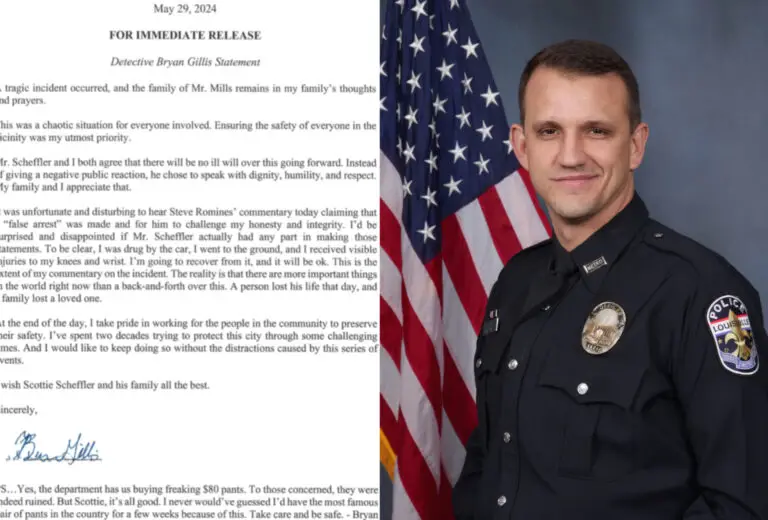Scottis Scheffler’s recent legal drama took a significant turn as all charges against him were officially dropped. This decision came amidst heated declarations from Bryan Gillis, the arresting officer, who staunchly defended his actions and criticized Scheffler’s lawyer, Steve Romines, for questioning his integrity.
On Wednesday, Jefferson County Attorney Mike O’Connell announced that the charges against Scottie Scheffler, which included second-degree assault, third-degree criminal mischief, and reckless driving, were being dropped. Detective Bryan Gillis, who was involved in the arrest, made several declarations following this decision, responding to the claims made by Scottie Scheffler’s attorney and shedding light on his perspective of the incident.
Gillis Defends His Actions
In a detailed statement, Detective Bryan Gillis expressed his disappointment with the allegations made by Scottie Scheffler’s lawyer, Steve Romines.
“It was unfortunate and disturbing to hear Steve Romines’ commentary today, claiming a ‘false arrest’ was made and for him to challenge my honesty and integrity,” Gillis wrote.
He emphasized that he sustained visible injuries during the encounter, stating, “To be clear, I was dragged by the car, I went to the ground, and I received visible injuries to my knees and wrist. I’m going to recover from it, and it will be okay.”
Gillis expressed his concern for Jon Mills, a 69-year-old security officer who was struck and killed on Shelbyville Road by a shuttle bus earlier that morning, which was the cause of the traffic backup and delayed the start of play on May 17. He concluded his statement by wishing Scheffler and his family “all the best”.
Gillis also added a bizarre postscript:
“Yes, the department has us buying freaking $80 pants. To those concerned, they were indeed ruined. But Scottie, it’s all good. I never would’ve guessed I’d have the most famous pair of pants in the country for a few weeks because of this. Take care and be safe.”
Gillis addressed the incident’s chaotic nature, acknowledging the stressful environment but maintaining that his actions were justified given the circumstances. He also appreciated Scottie Scheffler’s respectful demeanor following the incident, noting,
“Mr. Scheffler and I both agree that there will be no ill will over this going forward. Instead of giving a negative public reaction, he chose to speak with dignity, humility, and respect. My family and I appreciate that.”
Background of Scottie Scheffler’s arresting officer
Detective Gillis’s history with the Louisville Metro Police Department includes previous allegations of misconduct and the use of unnecessary force. These issues have further fueled the debate over his actions during Scottie Scheffler’s arrest.
The failure to activate his body camera during the incident was a significant violation of department protocol, leading to disciplinary action. Louisville Police Chief Jacquelyn Gwinn-Villaroel confirmed that corrective measures were taken following an internal investigation.
Scottie Scheffler released a statement expressing his desire to move past the incident and emphasizing his respect for law enforcement.
“Earlier today, I was informed by my attorney, Steve Romines, that all charges were formally dismissed in regard to the incident outside of Valhalla Golf Club on May 17,” Scheffler wrote. “As I stated previously, this was an unfortunate misunderstanding. I hold no ill will toward Officer Gillis. I wish to put this incident behind me and move on, and I hope he will do the same.”
In his final remarks, Gillis expressed concern for the broader implications of the incident, including the need for transparency and trust between the police and the community.
“The reason we have body cameras is so that there’s confidence in the police,” commented Louisville lawyer Michael Abate. “When you have systemic violations of that policy, that just breeds distrust.”
As the dust settles, both Scottie Scheffler and Bryan Gillis seem keen to leave this episode behind, albeit with lingering questions about police conduct and procedural integrity. The resolution of this case highlights the importance of accountability and transparency in maintaining public trust in law enforcement.



